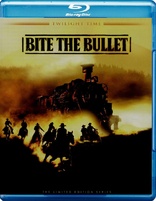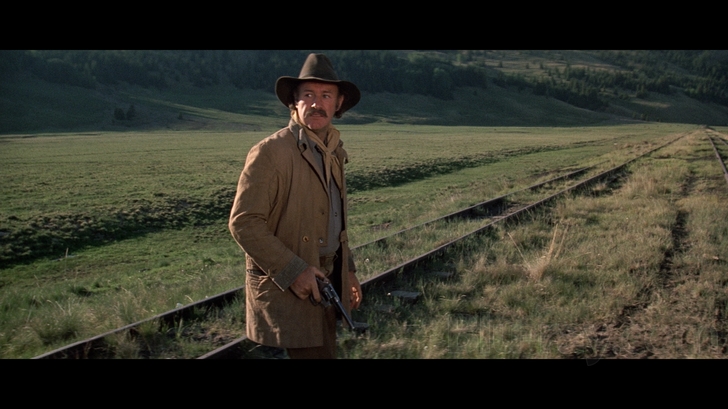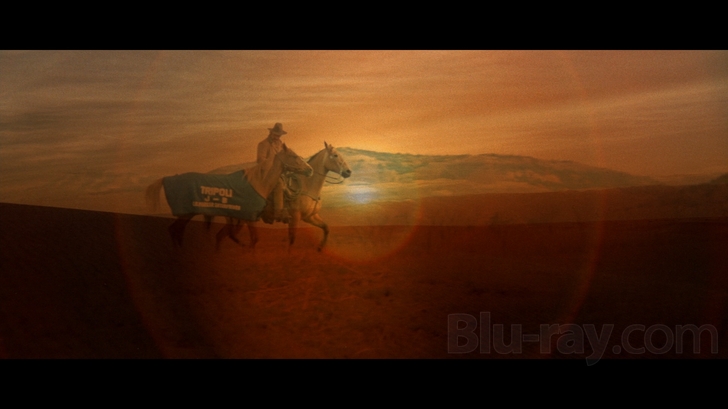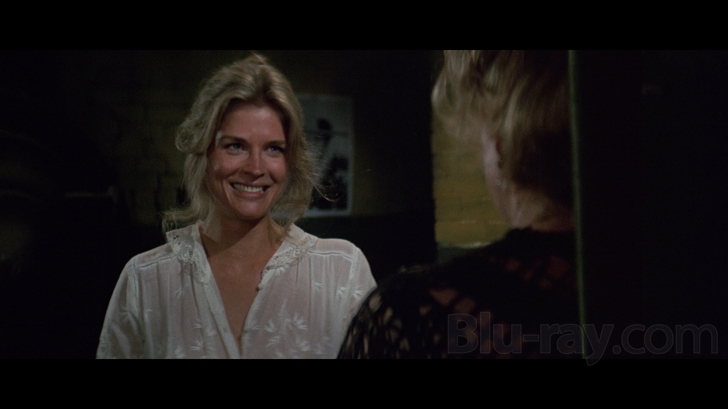Bite the Bullet Blu-ray Movie
HomeBite the Bullet Blu-ray Movie 
Limited Edition to 3000 - SOLD OUTTwilight Time | 1975 | 131 min | Not rated | Mar 13, 2012

Movie rating
7.2 | / 10 |
Blu-ray rating
| Users | 3.9 | |
| Reviewer | 4.0 | |
| Overall | 3.9 |
Overview
Bite the Bullet (1975)
A group of ex-rough riders, an ex-prostitute and a gunfighter enter a horse race in the desert.
Starring: Gene Hackman, Candice Bergen, James Coburn, Jan-Michael Vincent, Ben JohnsonDirector: Richard Brooks (I)
| Western | 100% |
| Adventure | Insignificant |
| Action | Insignificant |
Specifications
Video
Video codec: MPEG-4 AVC
Video resolution: 1080p
Aspect ratio: 2.35:1
Original aspect ratio: 2.39:1
Audio
English: DTS-HD Master Audio 5.1 (96kHz, 24-bit)
Music: DTS-HD Master Audio 2.0
Music: 48kHz, 16-bit
Subtitles
English SDH
Discs
50GB Blu-ray Disc
Single disc (1 BD)
Playback
Region free
Review
Rating summary
| Movie | 3.5 | |
| Video | 4.5 | |
| Audio | 4.5 | |
| Extras | 2.0 | |
| Overall | 4.0 |
Bite the Bullet Blu-ray Movie Review
Tasty.
Reviewed by Jeffrey Kauffman March 27, 2012Richard Brooks is one of the more strangely unremembered titans from Hollywood’s late, slightly tarnished Golden Era of the fifties, sixties and seventies. Born Ruben Sax in 1912, the future Oscar winner’s first forays into “show business” were via the radio, as a sports announcer, but he soon found one of his major callings in life, writing, and his well received 1945 novel The Brick Foxhole provided source material for 1947’s proto-noir Crossfire. Brooks’ novel was incredibly prescient for its time, a blistering portrayal of homophobia in the Marines (Brooks was a Marine in World War II) that frankly couldn’t be filmed in the forties and so was changed to a movie about anti- Semitism, something Crossfire shared with another big 1947 film, Gentleman’s Agreement. Though Brooks had contributed to some minor films before Crossfire (for which he did not write the screenplay), that film upped his Hollywood recognition factor substantially, and Brooks was soon at work as writer of such A-list films like Key Largo. In 1950 Brooks made the jump to hyphenate status as writer-director with Crisis, one of the few films to feature Cary Grant in a kind of dark, fully dramatic, role. Brooks really seemed to come into his own a couple of years later with the highly regarded (and again, incredibly prescient) Blackboard Jungle, one of the first films to confront urban decay and what was then called juvenile delinquency. In 1958 Brooks wrote and directed two big budget adaptations of famous fare from two of the most disparate sources imaginable, Fyodor Dostoevsky and Tennessee Williams, with his film versions of The Brothers Karamazov and Cat on a Hot Tin Roof. Brooks’ high water mark, at least in terms of critical acclaim and public recognition, may have been his 1960 version of Elmer Gantry, which brought home Oscars for stars Burt Lancaster and Shirley Jones. Brooks, certainly one of the most literate and literary writer-directors of his era, followed up Gantry with a variety of projects that saw him adapting everything from Joseph Conrad (Lord Jim) to Truman Capote (In Cold Blood) to, well, Richard Brooks (The Happy Ending). In 1966 Brooks made one of the more highly regarded westerns of that era, The Professionals, earning both a Best Director and Best Adapted Screenplay Academy Award nomination in the process.

The Western was a dying breed by the mid-sixties, and The Professionals was one of the decade’s best attempts to both honor some long held traditions while at the same time investing the genre with a bit of the then burgeoning counterculture ethos. In 1969, the Western genre was completely upended with two incredibly disparate films, Butch Cassidy and the Sundance Kid and The Wild Bunch, both of which in their own way completely reinvented the idiom in their own image. Butch Cassidy was by far the bigger hit and for a number of years afterwards, a lot of filmmakers tried to mimic Butch’s scenarist William Goldman’s quasi-contemporary jokey, loosey-goosey feel, usually without much success. When Brooks returned to the Western genre in 1975 for Bite the Bullet, he had probably seen the writing on the wall for these Butch Cassidy wannabes, and while there are a couple of elements that may remind some viewers of some aspects of that film (notably in the buddy buddy relationship between Bullet’s stars, Gene Hackman and James Coburn), the really interesting parallel to former films comes from a couple of rather unlikely sources.
The sixties saw two films come out within four years of each other with at least a couple of common stars and more than a couple of common plot points. Both 1965’s The Great Race and 1969’s Those Daring Young Men in Their Jaunty Jalopies were breezy comedies (Race was actually more of a classic farce) that depicted long distance races in the early days of the automobile. Both films featured large casts, and Jalopies, ostensibly the more “realistic” of the two (a decidedly relative term in this case), featured a number of “national” types culled from various countries. Bite the Bullet is indeed about yet another long distance race, and its timeframe of circa 1906 places it squarely in the nascent days of the internal combustion engine, but Brooks’ film is actually about a somewhat older mode of transportation, the horse. Based more or less on fact, Bite the Bullet depicts a grueling 700 mile horserace in treacherous territory in the American West, and while there aren’t “national” types per se in this film, we again get a disparate group of characters, all of whom have their own agendas and motives for entering the race.
Gene Hackman plays Sam Clayton, an ex-Rough Rider who as the film opens is helping get one of the race horses to the starting line, but who comes across an abandoned foal whose mother (evidently headed for the glue factory) has died. Clayton’s love for animals is on display right off the bat as he hoists the little horse right onto the back of the horse he’s bringing along and gets it to a ranch, where he bestows it upon an awestruck little boy. In the meantime, we meet some of the other prospective competitors. James Coburn is yet another ex-Rough Rider, an old buddy of Clayton’s named Luke Matthews. Candice Bergen plays the mysteriously half-named Miss Jones, a former “working girl” who is entering the race for what turns out to be some surprising reasons which are revealed in the film’s somewhat problematic climax. Ben Johnson is the even more minimally named Mister, an elderly cowpoke who knows his days are numbered but wants to win this race as his dying claim to fame. Ian Bannen is Sir Harry Norfolk, a British aristocrat enamored of the American West. Jan-Michael Vincent is a brutish young kid named Carbo, a sadistic boy who punches cows (literally) and thinks of himself as the Big Man on the Prairie, despite the fact that he’s had no practical experience as a cowboy or a horse racer. Finally, Mario Arteaga is the ethnically identified Mexican entrant whose uncomfortable dental problem leads to Miss Jones and Clayton fashioning a crown out of a bullet casing to get him through the race, literally biting the bullet.
Despite coming in at a little over two hours long, Bite the Bullet is largely an anecdotal affair that gives us a little information about each of these characters in dribs and drabs and lets us draw our own conclusions about the inner moral fiber. In this regard, the film is a little obtuse and lacks a visceral emotional connection where there really should be one, namely with Clayton’s character. Clayton is shown to be a fine, upstanding man, one who cares deeply about all the right things—animals, women, children—but because he comes off more as a symbol than a living, breathing being, it’s hard to really feel anything about him. The real emotional pull here is in the opposite direction, outright loathing for the Vincent character, whose outright torturing of his horse leads to one of the film’s most palpably impactful sequences. That said, after this sequence, Vincent’s character does an abrupt 180, and it’s as if nothing that had gone on before for the previous hour and a half had ever happened, both regard to himself and especially with regard to his rocky relationship with the Hackman character.
Perhaps the film’s worst misstep is with the Bergen subplot, which is hinted at in an early establishing scene where Miss Jones reveals, obliquely anyway, the reason for her entering the race. When the actual explanation for her discursive mention early in the film is revealed at the film’s climax, it initially provides some excitement, but, like the Vincent arc, just peters out and is literally dropped, with Bergen riding off, if not exactly into the sunset, at least over the horizon. It makes the whole sequence something of a head scratcher, seemingly developed just to be able to get Coburn and Hackman into a motorcycle with a sidecar, chasing a bunch of horse riding bad guys over bumpy terrain.
Despite some of the dramatic inconsistencies that hamper Bite the Bullet, this is a hugely enjoyable, incredibly scenic film. Though Brooks perhaps overuses the then trendy zoom lens a bit too often, he captures some amazing scenery and a couple of set pieces within the film are exquisitely staged. One fantastic process shot that has Vincent attempting to overtake Coburn has both characters on their horses, with one in slow motion and the other at normal speed. Some of the desert footage, with vast expanses of white sands, seems to have come straight out of a Western reimagining of Lawrence of Arabia. What is most remarkable about this film is the incredible stunt work done with some of the horses. The HBO series Luck starring Dustin Hoffman recently made front page news when the cable network cancelled it, despite decent ratings, after three horses had been killed during filming. Now, this is a series set in the contemporary world of horse racing, without the incipient dangers of shooting in treacherous terrain, as with Bite the Bullet. Brooks was on record when Bite the Bullet was released as stating absolutely no harm came to any horse, and certainly no death, which, once you’ve seen the film, is an incredible accomplishment.
Though Brooks would continue working for another decade or so, Bite the Bullet, along with 1977’s Looking for Mr. Goodbar, is arguably the writer-director’s last stand atop the shifting sands of Hollywood. Bullet probably shows of Brooks’ talents more as a director than as a writer, for the screenplay is a bit haphazard, incompletely developed, and at times too anecdotal for its own good. But on a pure enjoyment level, Bite the Bullet is certainly one of the grander Western outings of a decade that didn’t really seem to know how to handle what was once the prototypical American film idiom.
Bite the Bullet Blu-ray Movie, Video Quality 

Bite the Bullet is presented on Blu-ray courtesy of Twilight Time with an AVC encoded 1080 transfer in 2.35:1. Just as with Twilight Time's simultaneously released Demetrius and the Gladiators, and indeed with all Twilight Time releases, the niche label is dependent upon whatever HD masters its licensing partners provide it to release. In the case of Demetrius, they had Fox providing a less than desirable master. In the case of Bite the Bullet they had Sony/Columbia providing a largely immaculate master that looks absolutely fantastic in this often stunning high definition presentation. Sharpness and clarity are top notch, depth of field is truly awesome (almost all of this film is shot out of doors), colors are bold and vibrant and contrast and black levels are spot on. About the only niggling complaint (and it's truly niggling) is some very minor ringing which can be seen in some of the brightly backlit desert sequences. Otherwise, this is certainly a magnificent presentation of one of the more scenic films of its era.
Bite the Bullet Blu-ray Movie, Audio Quality 

Bite the Bullet's lossless DTS-HD Master Audio 5.1 is similarly a raucous, highly enjoyable affair, with nicely consistent surround activity that subtly yet effectively provides a sonic recreation of the vast outdoor expanses through which these riders make their way toward the finish line. Dialogue is crisp, clear and very cleanly presented, but perhaps the finest aspect of this mix is the Oscar nominated score by the one and only Alex North, working here in a sort of proto-Copland vocabulary, albeit with fun, discordant leaps and lurches that wonderfully depict the ambling gait of the horses. Fidelity is top notch throughout this track and dynamic range is also surprisingly wide and varied.
Bite the Bullet Blu-ray Movie, Special Features and Extras 

- Isolated Score. Is it possible that Alex North never won a "real" Academy Award? (He was finally feted with a 1986 Honorary Award after having been nominated some 15 times but losing.) North, one of the supreme craftsman of his time, was always uniquely melodic yet pungently rhythmic as well, and his scores were always incredibly colorful affairs, something that's certainly true of his Oscar nominated work here, presented via a lossless DTS-HD Master Audio 2.0 track. On a related note (no pun intended), for those who aren't that familiar with North's oeuvre, I cannot recommend highly enough the exquisite 2 CD release of his score for the Elizabeth Taylor – Richard Burton Cleopatra, a release restored and produced by Twilight Time's Nick Redman. (True trivia fans know that North also wrote the original score for 2001: A Space Odyssey, which Kubrick jettisoned in favor of the classical musical cues that ended up in the film.)
- Original Theatrical Trailer (HD; 2:30)
Bite the Bullet Blu-ray Movie, Overall Score and Recommendation 

Bite the Bullet isn't without flaws, but it's easy to overlook most of them since the film offers such winning star performances and features such incredible scenery. While this may in fact not be Brooks' most artfully crafted screenplay, the film certainly show off his directorial acumen and it remains one of the better Westerns from an admittedly less than spectacular decade for the genre. This Blu-ray features spectacular video and audio, and it comes Highly recommended.
Similar titles
Similar titles you might also like

Shalako
1968

Big Kill
2018

Stagecoach
1939

Shoot the Sun Down
Director's Cut
1978

Major Dundee
Limited Edition
1965

In a Valley of Violence
2016

The Spikes Gang
1974

The Kentuckian
1955

Valdez Is Coming
1971

The Train Robbers
1973

Sweetwater
Sweet Vengeance
2013

The Magnificent Seven Ride!
1972

Macho Callahan
1970

The Professionals
1966

Wagon Master
Warner Archive Collection
1950

Chato's Land
2K Restoration
1972

Ulzana's Raid
1972

The Hills Run Red
Un fiume di dollari
1966

Vera Cruz
1954

Big Jake
1971